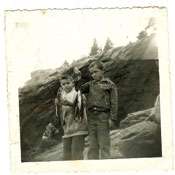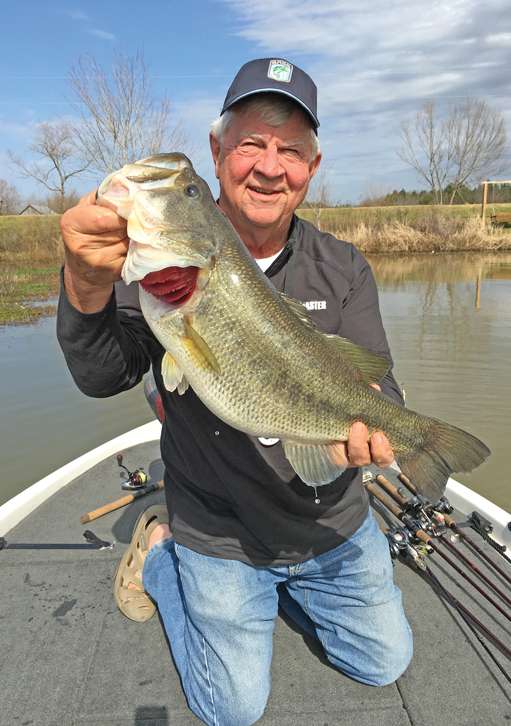
In the first year after founding the Bass Anglers Sportsman Society of America, Ray Scott recruited about 2,000 members.
He did so through publicity (including articles in Field & Stream by Jason Lucas and Sports Afield by Homer Circle) and word of mouth — mostly Scott's mouth.
With no money for slick marketing campaigns, Scott could only skim the surface. But the surface is where you get the cream, and the first BASS members were definitely the cream of the crop — the most avid, active and loyal bass anglers he could have hoped to find.
In celebration of BASS' 40th anniversary, we set out to find and interview as many of those charter members as we could. They come from a variety of backgrounds and ZIP codes, but they all share a common obsession: bass fishing. They were then and are now nuts about the sport. Following are some of their comments.
WHY DID YOU JOINT BASS?
"I came home from the service in January 1968 and a letter was waiting for me from Ray Scott telling me about BASS. I thought, 'Maybe this will fly.' I went back to work, saved up some money, and joined for life. As much as I love fishing, I thought it was worthwhile. There are a lot of guys lik e me, where it's an obsession. It was fun kicking around with people who loved and understood fishing."
—Bart Shanley, 65, Roselle, Ill. (Retired salesman)
"I joined for educational purposes. I got a letter from Ray Scott asking me to join. Roland Martin and I were friends, so I called him, and he suggested I join. It's still educational to me — I'm learning new techniques with lures like swimbaits, shaky head jigs and finesse worms."
— Patrick McEvoy, 67, Snellville, Ga. (Retired sales manager)
"Bassmaster Magazine started and everyone wanted it. It gave you information about what was going on. It was the reason you started back then. It was the only information avenue. Everybody I knew was a member. It was our magazine. It was something you looked forward to; you know, 'When's the next issue coming?' I learned so much about new lures, depthfinders, rods and reels. Anything new I wanted to try."
— William King, 68, Mabelvale, Ark. (Retired legal investigator)
Ray Scott got my name from taxidermist Archie Phillips, who mounted an 8-pound, 4-ounce Indiana bass I caught. I gambled on this new venture by sending $100 for a life membership in October 1968. That bass, by the way, was later used as a prop with other old fishing items in the movie Rudy. My sweetheart and I got to go to the movie premiere and meet the cast. That fish has done so much for me."
— Dan Basore, Warrenville, Ill. (Renowned tackle collector)
WHAT WAS BASS FISHING LIKE WHEN BASS WAS FOUNDED?
"Bass fishing back then was like the 13th century, compared to the way it is now. Depthfinders were unheard of, and most everyone used stick-steering boats." Catch-and-release? "One guy I knew had a hammer in his boat. He'd hit the fish and take it home and cook it!"
— Ken Caldwell, 68, Cadiz, Ky. (Retired civil servant)
"When BASS was formed, I was fishing a new lake called Toledo Bend on the Texas/Louisiana border. I have never experienced such fishing in my life. Even a novice like myself could limit every time I went."
— Frank J. Diehm, 68 Ardmore, Okla. (Retired supervisor at Tinker AFB)
"Bass fishing back in 1967 was more enjoyable because there was less boat traffic, and a lot fewer fishermen. Bass were bigger and there were more of them. The lakes were in worse condition than now, though. Thanks to BASS and other fishing groups the lakes have gotten a lot better in terms of water quality, launch areas and fish quality."
—Terry Crawford, 57, Latrobe, Pa. (Maintenance manager for a private estate)
"In 1967, I moved to east Texas, so I fished Sam Rayburn Lake, which was new and hot — very hot. I kept a lot of fish to eat, and the guys I fished with did also. There have been times when each one of us would limit out (15 fish ,12 inches or better) in two or three hours and never move more than 150 to 200 yards. We were fishing structure most of the time, including creek channels, timberlines and old roadbeds."
— Sabe Comley, 79 Bedford, Texas. (Retired air traffic controller and FAA manager)
"Lure choice was easier. All you had to worry about was whether you had the right colors. The biggest difference between fishing back then and now is the equipment. Nowadays, electronics let you see the bottom and the size of the fish. Trolling motors are quiet and don't require being charged so often, thanks to new, improved batteries.
And boats also are safer, more adapted to fish tournaments and have much faster motors."
— Jim "Comanche" Johnson, 83 (Retired, U.S. Air Force)
"When I moved to Belton, Texas, in 1964, I joined the Temple Bass Club, maybe the first bass club ever formed in Texas. Dr. Jack Weinblatt, a member of our club, made a little talk at one of our meetings (complaining) about all this power everybody was putting on the back of their boats — some were using motors with as much as 50 horsepower. Bass fishing was great back in 1968. … Bass fishing has always been great!"
— Ray Hays, 81, Belton, Texas (Retired, U.S. Department of Agriculture)
"BASS was a big factor in the changes in tackle we used back then. I was using 10- and 12-pound-test line in the late '60s that was bigger than 20-pound today. Everybody fished with 5 1/2-foot bass rods. If you weren't using a 4/0 sproat hook, you were using the wrong dang worm hook. You'd buy a box and have to sharpen every one. Today's chemically sharpened hooks are so much better."
— Eugene Lacy, 74, Sam Rayburn, Texas (Retired local union business manager)
WHAT EFFECT HAS BAS HAD ON THE SPORT?
"Praise God for Ray Scott, because we would not have many of the innovations we now have if not for him. Before BASS, we used the old Pflueger 'knuckle-buster' reels with line that had to be stretched out and dried after every fishing trip."
— Dr. Bill Miller, Sterlington, La. (First president of the Louisiana Bass Federation)
"Bass fishing and the gear we used were crude before BASS came along. People mostly fished with spinnerbaits and topwaters back then. BASS is largely responsible for most of the advancements in fishing over the past 40 years. I can't believe how far things have come."
— Doug Westley, Haughton, La. (Retired, Louisiana Department of Transportation)
"One of the best things about Bassmaster Magazine, besides the helpful fishing tips, was the way it kept everyone on the same page. The entire membership was like one big family; no matter where you were in the United States, you had a friend you could count on. We all talked the same language."
— Robert Howard, 60, Muscatine, Iowa (Former vice president, Weber & Sons Button Co.; currently a candidate for the Iowa State House)
"Before BASS, individuals simply fished for the love of the sport. There was no organization, no means of communication between fishermen. There was no specialized equipment like there is today, and there was no leadership like Ray Scott provided."
— Tom Sparrow, 63, Auburn, Ala. (Retired director of Athletic Facilities, Auburn University)
"Before BASS was organized you got your fishing information from a few sports magazines and newspaper columns, but the information you received was limited to whatever the person writing the story knew or had experienced. Bassmaster Magazine changed that. Bob Cobb would pick the brains of the best bass anglers in the world and share it with every member. Bassmaster also kept members informed on ways to halt the destruction of our fisheries. BASS was not afraid to call a spade a spade and demand a stop to polluting the waterways. Bassmaster bound all the members together."
— Harold Sharp, Hixson, Tenn. (Former BASS tournament director and the second member of BASS)
IS FISHING BETTER OR WORSE THAN IT WAS IN 1968?
"In the late '60s, I fished all over Illinois, Wisconsin, Minnesota, Florida and Missouri, and fishing was a lot better then than now. There were bigger fish then."
— John Slager, 71, Beecher, Ill. (Retired carpet cleaner)
"I'm a firm believer that fishing today is better than it's ever been. There are instances where the reverse is true, but overall I am absolutely convinced that the good ol' days are still ahead of us."
— Andrew Marcantonio, 54, Steilacoom, Wash. (Outdoor writer, retired Army colonel, former fisheries biologist)
"Fishing was great back then. It ain't worth a toot, now! The lakes have gotten polluted. I went fishing last week and caught only one bass."
— James "Jake" Jacobs, 75, Clover, S.C. (Retired millwright)
WHAT IS YOUR FAVORITE HIGHLIGHT FROM YOUR FISHIING CAREER?
"I was fishing the final day of a tournament on Millwood Reservoir (Ark.) and toward the end of the day, I noticed a Tennessee Shad crankbait floating in the water. I picked it up and thought that was a really weird lure to turn up out there. Who would fish with that thing on Millwood? I ran into Rick Clunn a week later and I told him about the crankbait I had found. Clunn asked what kind of line was tied onto it. I told him, and he said that was his crankbait. It had broken off while he was fighting a big fish."
— Paul Williamson Jr., 66, Tyler, Texas (Retired Sears store manager)
"On Feb. 17, 1968, I caught the biggest largemouth in the state of Mississippi. It weighed 11 pounds, 8 ounces. I also held the world record for bowfin, 14 pounds, for about three months in 1970. Another highlight was having my cartoon published in the Winter 1970 issue of Bassmaster."
— John T. Carr, 71, Tupelo, Miss. (Retired draftsman and product engineer)
"In the early 1960s I fished in the oxbow lakes off the Mississippi River. One day I was late getting to the boat dock, and all the boats were rented. Another fisherman invited me to join him for a couple of hours of fishing. He had a 15- or 16-foot aluminum boat with pedestal seats and more lures than our local Wal-Mart. I was amazed when we made our first stop about 100 yards off a long point. I had never heard of catching a bass more than 10 feet away from the bank. My partner explained that there was a brushpile in about 10 feet of water and pointed me in the direction to cast. We caught some very nice bass. It was my first time to fish 'offshore' and my first time to meet Bill Dance."
— Wayne Barksdale, 71, The Villages, Fla. (Retired, National Labor Relations Board)

